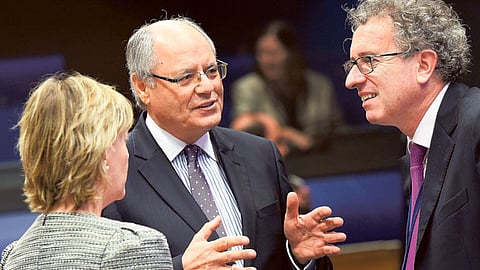France sticks to its stand of ‘no austerity’
European Commission has little choice but to reject member state’s budget

Luxembourg, Paris: Ever since the French government unveiled its 2015 budget two weeks ago, fiscal enforcers in Brussels have attempted to convince Paris it must do more - making additional spending cuts and implementing more reforms - for them to accept the plan.
In recent days, as the prospect of a EU rejection became imminent, the discussions moved beyond the normal economic channels, pulling in members of the still-to-be-approved European Commission, including Jean-Claude Juncker, its incoming president, and Frenchman Pierre Moscovici, his economic nominee.
“Juncker’s line is: help me to help you,” said one EU official involved in the talks.
But hopes of an eleventh-hour deal have faded. The chances of the French government making any changes before the outgoing Commission rules on the budget at the end of the month are also waning.
Instead, Paris has adopted a defiant stance. Manuel Valls, the prime minister who is a strong advocate of reforms, has responded angrily to increasingly vocal charges that France has not done enough.
“The president of the eurogroup [Jeroen Dijsselbloem, who is also the Dutch finance minister] should not make remarks like these. It is we who decide our budget,” he said. “I will not accept lessons on good government.”
The intransigence has left the European Commission little choice but to use the last meeting of its mandate to reject the budget, sending it back to Paris for more work. In an effort to soften the blow, officials are considering adding three other countries to the reject list - most controversially Italy, but also Malta and Slovenia - in an effort to show it is not singling out Paris.
Italy has also been defiant, insisting it will not breach EU rules when it submits its spending plan despite warnings it is not reducing its debt fast enough. “There is no negotiation with Brussels,” insisted Pier Carlo Padoan, the Italian finance minister.
The last time France sought lenience from Brussels was just last year. On the sidelines of a February G20 meeting in Moscow, Moscovici, then the French finance minister, agreed with Olli Rehn, the then EU economic chief, on a set of reforms his government would make. Rehn took the government at its word and granted it a two-year extension of its deadline - originally 2013 - for bringing the deficit within the EU limit of 3 per cent of national output.
“In a way, I always considered it as a test case,” Rehn said. “It’s not fair to say they didn’t do anything, but they didn’t do enough... The Commission is bound to take a critical decision.”
Michel Sapin, the finance minister, said in an interview earlier this month that going beyond the €50 billion (Dh232.72 billion) in spending cuts promised over the next three years would pose too great a recessionary risk. For domestic political reasons, the government also cannot be seen to be caving in to Brussels before it has even deposited its budget proposal.
But the government is acutely aware it needs to show its European partners it is willing to do more if it wants to win approval for further delay in reaching the deficit target. Instead, it will actually rise this year to 4.4 per cent before falling slightly to 4.3 per cent by next year’s deadline.
Moscovici, who will inherit the unenviable task of ruling on his former boss’s work when he takes office on November 1, has been urging President Francois Hollande to be more forthcoming, particularly on the deficit. Officials said that in private conversations Hollande is more open to at least showing his government is on the right track and has urged measures that would see the deficit continue to drop.
But the government is putting the emphasis on its willingness to push on with economic reforms rather than budget cutting.
— Financial Times



